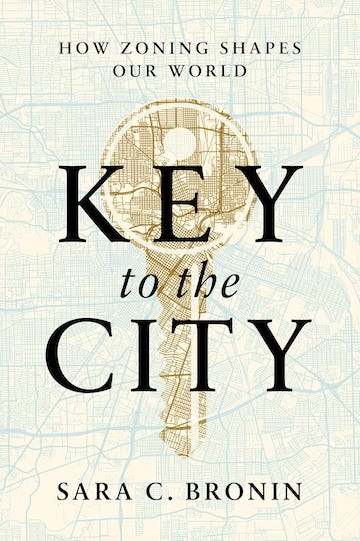7 Must-Read Books About Cities Coming This Fall
If you're tired of national politics, read these books instead
As someone who published a book in October 2020, two weeks before the presidential election and during the second wave of the pandemic, I know it can be very, very hard to get attention for your book in an intense political season. But I also know how much I crave conversations on important issues other than politics during the run-up to the election. For these reasons, I’m looking ahead to some great books that are coming out this fall.
In chronological order, here are the best and most relevant ones I could find to share with you. I am excited to get galleys of these books and possibly, maybe this fall actually start the book club I set out to host at the beginning of the year.
Key to the City: How Zoning Shapes Our World by Sara C. Bronin (W. W. Norton; October 1, 2024)
In 2020, Sara Bronin launched the National Zoning Atlas which aims to make transparent the zoning regulations of the country’s more than 30,000 municipalities. While some of the maps the Atlas produces are stunning in the way they show how much of the country is dedicated to single-family housing, the Atlas doesn’t explain why the zoning is the way it is and why people should care about it. Key to the City does that by exploring how zoning shapes our cities and in turn calls for action to improve zoning codes to better match our aspirations for our communities with the laws that decide what can be built in them. Read more.
Lost in Austin: The Evolution of an American City by Alex Hannaford (Harper Collins; October 1, 2024)
Alex Hannaford is a longtime journalist who has watched Austin evolve through the development of its vibrant music scene, the impact of rapid urbanization, and the challenges of gentrification. Part of the description of Lost in Austin says the book “serves as a critical exploration of the transformation that has befallen one of America’s most beloved cities—and serves as a warning for what the homogenization of cities means for American urban identity.” Those are issues The New Urban Order takes up frequently, so this seems very timely and relevant to me. Read more.
Meet Me at the Library by Shamichael Hallman (Island Press; October 8, 2024)
Senior Library Manager of the historic Cossitt Library in Memphis Public Libraries and former Loeb Fellow, Shamichael Hallman argues that libraries offer ways to bridge socioeconomic divides, rebuild trust, and promote healthy democracy at a time when America is facing an epidemic of loneliness and isolation and is grappling with divisive popular culture. Hallman presents examples from his library system and others around the country, such as Lighthouse in the Library, a program bringing people together to discuss important topics in a safe and supportive space, and Cambridge Cooks, an initiative that fosters social connection by bringing people together over shared interest in food, to show how these civic institutions can fill a larger social and civic need in our cities. Read more.
Urban Power: Democracy and Inequality in São Paulo and Johannesburg by Benjamin H. Bradlow (Princeton University Press; October 22, 2024)
Benjamin Bradlow spent half a decade at Slum Dwellers International before getting a PhD in Sociology at Brown where his thesis resulted in this book, Urban Power. The central question Bradlow seeks to answer is: Why are some cities more successful than others in reducing inequalities in the built environment? Bradlow explores urban policy strategies in two megacities in two young democracies: São Paulo, Brazil, and Johannesburg, South Africa. Both cities came out of periods of authoritarian rule with similarly high inequalities and similar policy priorities to lower them. And yet São Paulo has been far more successful than Johannesburg in improving access to basic urban goods. Read more.
Below the paywall I’ll explore three more books including one about the evolution of Black cities in the U.S., one about New York City’s war on cars, and a book on how environmental innovations in design and construction can humanize our housing.








